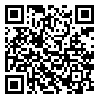مجله رویش روانشناسی از دادن گواهیهای کاغذی معذور است. لطفا تقاضا نکنید. همه گواهی ها در صفحه شخصی کاربران موجود است.
year 14, Issue 5 (Summer 2025 2025)
Rooyesh 2025, 14(5): 111-120 |
Back to browse issues page
Download citation:
BibTeX | RIS | EndNote | Medlars | ProCite | Reference Manager | RefWorks
Send citation to:



BibTeX | RIS | EndNote | Medlars | ProCite | Reference Manager | RefWorks
Send citation to:
Zerehsaz E, Ghasemi M, Sajjadian I. (2025). The mediating role of difficulty in emotion regulation in the relationship between insecure attachment and Internet gaming disorder in students. Rooyesh. 14(5), 111-120.
URL: http://frooyesh.ir/article-1-6096-en.html
URL: http://frooyesh.ir/article-1-6096-en.html
1- Master's student in clinical psychology,Department of Psychology, Isfahan (Khorasgan) Branch, Islamic Azad University, Isfahan, Iran.
2- Associate Professor, Department of Psychology, Isfahan (Khorasgan) Branch, Islamic Azad University, Isfahan, Iran. ,i.sajjadian@khuisf.ac.ir
2- Associate Professor, Department of Psychology, Isfahan (Khorasgan) Branch, Islamic Azad University, Isfahan, Iran. ,
Abstract: (635 Views)
This study aimed to determine the mediating role of emotion regulation difficulty in the relationship between insecure attachment and Internet Gaming Disorder (IGD) among students. The present research employed a descriptive-correlational method using structural equation modeling (SEM). The statistical population included all students of Islamic Azad University, Isfahan (Khorasgan) branch, in 2024. In this study, 220 students were selected as the sample using a convenience sampling method. Data were collected using the Difficulties in Emotion Regulation Scale (DERS; Gratz & Roemer, 2004), the Adult Attachment Styles Questionnaire (AASQ; Hazan & Shaver, 1987), and the Internet Gaming Disorder Scale-20 (IGD; Pontes, 2014). Data analysis was conducted using structural equation modeling. The results showed that the proposed model had a good fit. Findings indicated that avoidant and anxious attachment, as well as emotion regulation difficulty, had a direct positive effect on Internet Gaming Disorder (P<0.05). Furthermore, avoidant and anxious attachment had a direct positive effect on emotion regulation difficulty (P<0.05). The bootstrap test results revealed that avoidant and anxious attachment indirectly affected Internet Gaming Disorder through the mediating role of emotion regulation difficulty (P<0.05). These findings suggest that insecure attachment influences Internet Gaming Disorder both directly and indirectly through emotion regulation difficulty among students.
Type of Article: Research |
Subject:
Clinical Psychology
Received: 2025/03/6 | Accepted: 2025/03/18 | ePublished: 2025/08/1
Received: 2025/03/6 | Accepted: 2025/03/18 | ePublished: 2025/08/1
Send email to the article author
| Rights and permissions | |
 |
This work is licensed under a Creative Commons Attribution-NonCommercial 4.0 International License. |





